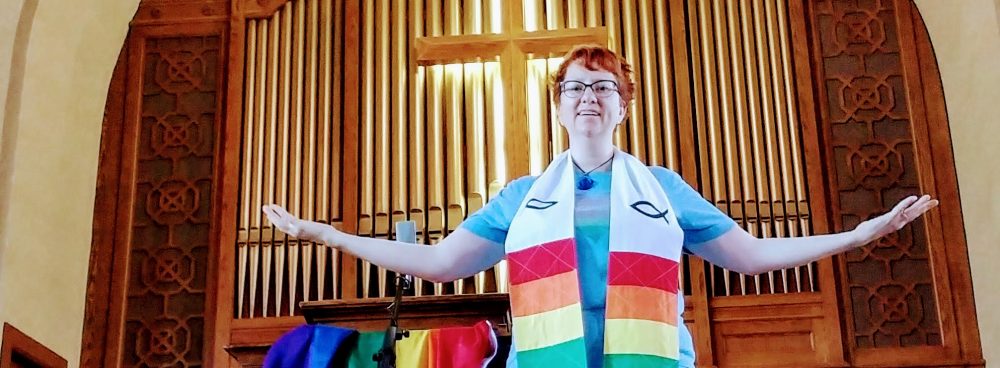This reflection is based on Isaiah 11:1-10. What kind of dream world is Isaiah living in? The wolf and the lamb together? The leopard and baby goat hanging out? The lion not eating the calf? The cow and the bear eating grass together and the calves and bear cubs playing together? The baby playing by the cobra and not getting hurt? Can you imagine it? It seems highly impossible to me.
But can you imagine a leader that has a spirit of wisdom and understanding? Can you imagine a leader that governs with a sense of God’s wisdom and God at the forefront of their leadership? Can you imagine a leader that listens and looks carefully before making decisions? Can you imagine a leader who treats the poor with respect and fairness and puts the oppressed first in their decision-making? Can you imagine a leader that says no to violence and abuse of power? Can you imagine a leader that puts justice and compassion as their first priority?
Isaiah is making the point that a just leader is about as improbable as the wolf and lamb lying down together. But Isaiah imagines, what if it could really happen? When Isaiah imagines the creatures getting along, there is a strong sense of security. The animals feel safe with creatures that would normally be natural enemies. And when leaders lead with their hearts, and their sense of God’s spirit, the unexpected can happen.
What would happen, if our leaders put the needs of the most marginalized Canadians first? What would happen if leaders cared for the earth by encouraging green energy rather than petroleum companies? What would happen if leaders made sure everyone had a living income rather than encouraging wealth in the hands of a few? What would happen if leaders put healthcare and education as priorities?
In scripture, peace is always connected with a sense of security and abundance. It isn’t just that fighting stops. Peace requires that justice is done for the most marginalized in society. Those whose voices are often silenced are heard. Everyone has access to what they need to thrive—food, shelter, and safety. As in this passage from Isaiah, there is security and safety. We can’t have peace and maintain the status quo at the same time. Peace as Isaiah describes it, requires a different type of leadership and a different set of priorities. It requires the creation and the most vulnerable people to be at the center of decision-making.
Along with the wolf and lamb living together, Isaiah asserts that “a little child shall lead them.” We often assume that age gives wisdom and the ability to lead well. We think worldly experience, wealth, status in society, education, and professional experience make a good leader. Sometimes these things are helpful but sometimes they get in the way of seeing the most vulnerable, most hurting and the poorest among us. Sometimes as adults, we get caught up in thinking and logic but sometimes, we need to lead with our hearts.
We teach children to care for others and to share and yet when we look for leaders, these are not always high on our list of qualifications. Children often have a strong intuition for when others are hurting. Most children have witnessed (or experienced) bullying. Most children have had the experience of being excluded. They know that these situations hurt and often want to do something to help. Children often have a strong sense of what is fair and are often more connected to their hearts than adults.
Many of us will know of Gretta Thunberg, a young climate activist. She began her public activism when she was fifteen. Her leadership was and is controversial for several reasons. She is a young woman who speaks bluntly. She challenges adults, governments, and corporations about their treatment of the earth. She makes those of us who are comfortable, uncomfortable. Prophets throughout our scriptures do the work of making the comfortable uncomfortable. Isaiah is doing it in this passage. Jesus spent his life disrupting the comfortable. Gretta and other young people are leading the work against climate change with their heart and their action. They are continuing the work of disrupting the comfortable. Many of us adults have gotten comfortable with the status quo and have limited ability to imagine the possibilities. We need children and young people to lead us in our church and in our world.
If we only listen to adults, nothing will change. We need the voices of children who listen to their hearts and imagine the possibilities. We need their creativity. We need their leadership. Imagine what would happen if we allowed children to have an equal voice. Imagine what would happen if we listened to their ideas and opinions and took them seriously. Would children be able to bring a “spirit of wisdom and understanding, a spirit of knowledge and reverence of Yahweh?” Would children be able to see those who are most vulnerable and hurting and bring a spirit of care to our church and world? Would children be able to help us care for creation in meaningful ways?
A child will lead them. In this season, we celebrate the birth of Jesus. We celebrate God coming among us as a child but then we wait for him to grow up before we take him seriously. If we really believe that God came as a human child, we need to celebrate God among us in the children around us. We need to recognize that children bring wisdom and value for who they are at any age. Children can help create the world that Isaiah is dreaming about—a world of peace, abundance, and security for all of God’s creation.

